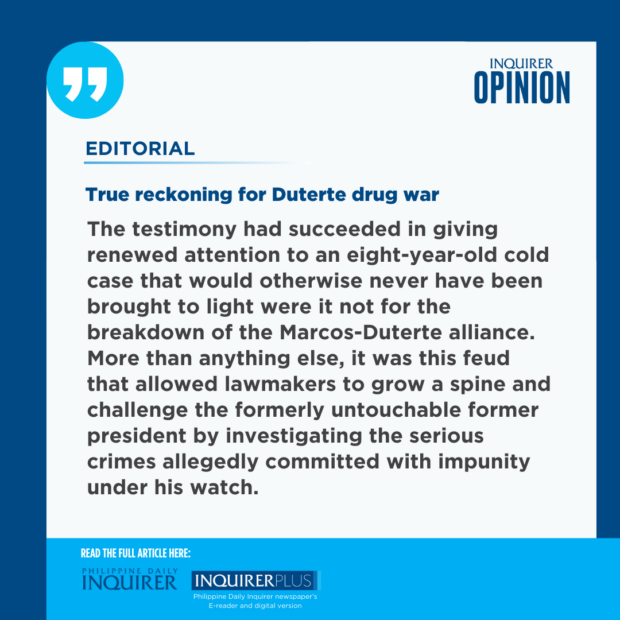True reckoning for Duterte drug war

Barely a month old, the House of Representatives quad committee has hit the ground running, assembling witnesses and gathering testimonies that cast new light into the brutal drug war of the past administration.
And its labors appear to be bearing fruit.
Although criticized by some as a political witch hunt, the panel has arguably accomplished in weeks what law enforcers and prosecutors failed to do in six years under the shadow of former president Rodrigo Duterte at the peak of his power.
Article continues after this advertisementThe inquiry’s latest bombshell: One of Duterte’s trusted police officers allegedly forced a Davao prison warden to go along with a plot to murder three Chinese drug trafficking convicts in 2016. Police Col. Gerardo Padilla, former officer in charge of the Davao Prison and Penal Farm in Panabo City, Davao del Norte, testified on Wednesday that he was “subjected to intense pressure” by Royina Garma, then a police colonel heading the Central Visayas regional command of the Criminal Investigation and Detection Group of the Philippine National Police.
‘Cooperate or else’
Garma, who went on to lead the Cebu City police before being tapped as general manager of the Philippine Charity Sweepstakes Office in June 2019, allegedly told Padilla to “not question (the operation) whether you like it or not” and to “cooperate or you will be sorry” in the sinister conspiracy against Chu Kin Tung, Li Lang Yang, and Wong Meng Pin.
At the time, the official story reported by Davao authorities was that the three prisoners were stabbed dead by two Filipino inmates in an altercation on Aug. 16, 2016.
Article continues after this advertisementIn making the fresh allegations, Padilla recanted his earlier testimony, reasoning that he had withheld information in fear of his life and that of his family. The former warden, however, stopped short of throwing any direct accusations against Duterte himself, a manifest illustration of the former president’s potent hold over his former subordinates.
Padilla said he had felt “pressured” because he knew Garma had the backing of the higher-ups.
“By intense pressure, you meant that there was a bigger person behind Garma’s instructions?” Manila Rep. Bienvenido Abante pressed him. “Is that ‘big person’… our former president?”
Padilla’s reply was immediate: “I’m not implicating him.”
Emboldened lawmakers
Still, the testimony had succeeded in giving renewed attention to an eight-year-old cold case that would otherwise never have been brought to light were it not for the breakdown of the Marcos-Duterte alliance.
More than anything else, it was this feud that allowed lawmakers to grow a spine and challenge the formerly untouchable former president by investigating the serious crimes allegedly committed with impunity under his watch, motivated by the impulse to please the new Chief Executive.
Of course, whether the joint House panel–comprising the committees on dangerous drugs; public order and safety; human rights; and public accounts–would be able to establish that such crimes were done with Duterte’s imprimatur is a question that won’t be answered anytime soon.
But as a start, it is an encouraging one, and the hope is that the emergence of new whistleblowers creates a ripple effect so that more eyewitnesses will surface to reveal what they know.
Last month, for instance, the committee learned from the former drug war “poster boy,” Police Lt. Col. Jovie Espenido, former police chief of Albuera, Leyte, that Duterte’s closest associates allegedly ordered police officers to use “all means necessary” to eradicate drug suspects and to reward the deed under a so-called “quota and reward system.”
Not a court of law
It is important to note that the quad committee’s findings, much like the discoveries of Senate blue ribbon investigations, are only as good as their legal outcome. The committee, after all, is a congressional body and not a court of law, and no Philippine judge to date has attempted to bring Duterte and his subordinates to justice for the alleged crimes raised during the inquiry.
That brings us to the touchy issue of the International Criminal Court (ICC) prosecutor’s investigation of drug war killings. While we hope that the result of the quad committee’s findings is the prosecution of all those culpable in the drug war in Philippine courts, any criminal charges arising from them should not preclude the ICC prosecutor from pursuing a separate and independent inquiry.
We applaud the House quad committee members for their newfound zeal in digging up Duterte-era skeletons, but ultimately, their actions serve interests that are more political than legal, however those interests may coincide with the quest for justice for the thousands killed in the drug war.
In the end, the true reckoning for the war on drugs waged by Duterte and his lieutenants won’t be made before a panel of lawmakers but before the eyes of the law. If that’s unrealistic for local courts in today’s legal and political climate, then an international tribunal must be allowed to take on the task instead.
















